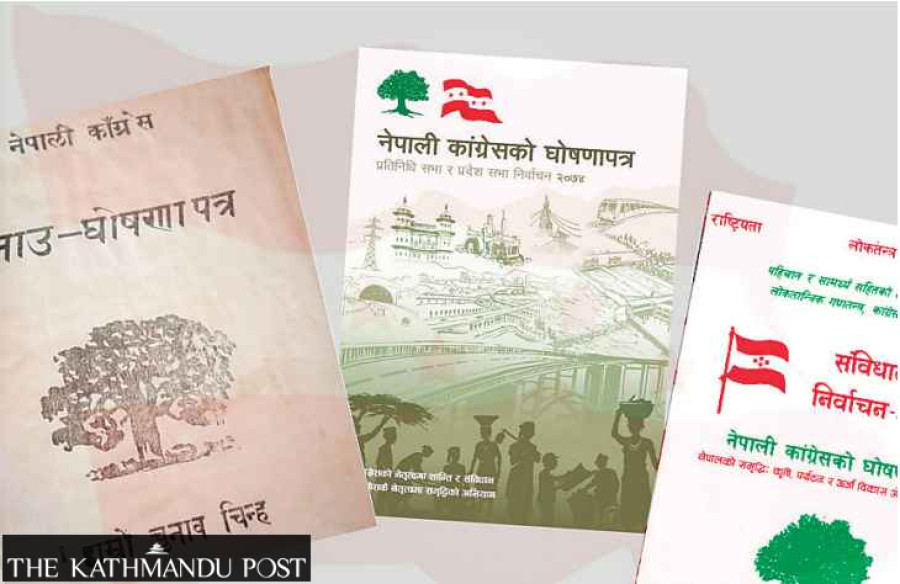Politics
Nepali Congress mum on secularism, vows to strengthen federalism
The party’s manifesto says it will create 1.25 million job opportunities in the next five years, if voted to power.
Tika R Pradhan
On Saturday, the Nepali Congress party, which leads the government and a five-party electoral alliance, unveiled its election manifesto, promising to strengthen federalism that the 2015 constitution incorporated. The party, however, has not touched on secularism, another key constitutional feature that is increasingly coming under fire from right-wing forces.
Another key constituent of the electoral alliance, CPN (Maoist Centre), has a strong allegiance to the agenda of secularism on which some other major parties like the CPN-UML seem to be distancing themselves in order to cash in on the country’s large Hindu constituency.
Despite forging an electoral alliance with the Maoists across the country along with two other parties, the Congress has come up with a separate manifesto for the November 20 federal and provincial elections.
Political analysts say the party should have clarified its stance on secularism instead of avoiding it, especially when some party leaders want to restore Nepal’s ‘Hindu state’ status.
“The party should not have left out secularism from its manifesto,” said Uddhab Pyakurel, a political analyst.
Though the Congress officially backs secularism, some of its key leaders like former general secretary Shashank Koirala have been vocal supporters of reviving Hindu statehood. Also, Shekhar Koirala, who leads the party’s rival faction, has softened his stance on secularism to appeal to Hindu-leaning constituencies.
Prime Minister Sher Bahadur Deuba himself is believed to be trying hard to deepen his relations with the Indian establishment, which is unhappy with the conversion of Nepal into a secular state.
In this backdrop, the failure to mention ‘secularism’ is being seen as a meaningful gesture.
Manifesto drafting committee spokesperson Jivan Pariyar, however, said they had skipped the issue because “there was not much to say about it”.
In the manifesto, the Congress has once again come up with tall claims and promises—a business-as-usual approach for one of the country’s oldest parties, despite Congress governments’ past failures to make substantive progress on what it promised.
The Sher Bahadur Deuba-led government has followed in the footsteps of his predecessor KP Sharma Oli when it comes to undermining the provinces and local federal units, but in its manifesto the Congress claims that it will work to strengthen the provinces.
The Deuba government has not held a single meeting of the inter-provincial council but Point 9 of the manifesto’s Part 4 states that the council will be made effective to ensure cordial relations between the federal, provincial and local levels.
Accusing the UML of failing to govern despite having a comfortable majority, the Congress has also vowed not to dissolve the House unconstitutionally.
The manifesto promises to secure the rights of the disadvantaged groups by amending the constitution. Besides the Madhesh-based parties, various other groups have also been asking for constitutional amendments to address their concerns.
The party has promised to cut extreme poverty to a single digit within a decade while outlining its long-term strategies for national development.
The manifesto offers free electricity to people consuming up to 50 units while important documents of the citizens would be delivered directly to their doors.
Critics say the promises have nothing to do with the party as it is the public—the voters—who pay taxes to be eligible for subsidies on vital things like electricity. The party has also promised to reduce the eligibility for old-age allowances to 65.
With elections in mind, the Oli-led government had increased the allowance from Rs3,000 per month to Rs4,000 while the Deuba government lowered the eligibility age from 70 to 68 so as to impress the voters, but without any study on the financial viability of the scheme. Now, the Congress vows to decrease it to 65, which, according to political analysts, is a populist agenda that could weigh heavy on state coffers.
“The manifestos of Nepali political parties have traditionally been attractive,” said Pyakurel, the political analyst. “The problem lies in implementation. As the voters also don’t seem much bothered about this, the parties have made it just another ritual.”
The Congress has also promised to reduce the contribution of remittance in the national economy from 23 percent to 10-12 percent. For that, if the party got a majority, it would develop an entrepreneur-friendly environment and create jobs at home.
The Congress has vowed to seek lasting solutions to the perennial and recurring problems, including those related to garbage management, sugarcane farmers, fertiliser shortages, public service delivery and hurdles in foreign employment, but it doesn’t elaborate how the goals will be achieved.
Nepali political parties are known to make lofty promises on almost every issue but to forget most of the commitments soon after they form the government.
The party says it will create 1.25 million jobs in the next five years—some 2.5 million people will enter the job market in the period.
The Congress aims to boost the use of electric vehicles and electric stoves by 50 percent in the next five years—at a time the Deuba-led government has been increasing taxes on most kinds of electric vehicles.
In the next five years, the party says it will develop 10,000 megawatts of power while increasing per capita consumption to 1,200 units a year.
On the development front, the Congress has failed to mention any of the projects which the other parties have been talking about.
The 52-page document, which the party has termed “commitment paper”, is divided into five chapters dealing with contemporary politics, national issues, seven decades since the dawn of democracy in Nepal, a roadmap for a prosperous Nepal, and strengthening of federalism and provincial governments.
The 41-member manifesto drafting committee led by party’s general secretary Bishwa Prakash Sharma had Swarnim Wagle and Geja Sharma Wagle as its members.




 18.12°C Kathmandu
18.12°C Kathmandu















